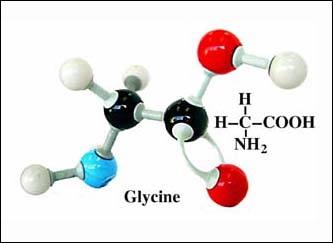Glycine - Uses, Benefits, Sources and Dosage

Glycine is the simplest amino acid which is mandatory for the biosynthesis of nucleic acids, bile acids, porphyrins, phosphate and other amino acids. Glycine is the second most common amino acid found in the proteins. It is also the part of coenzyme named as the glutathione which is involved in various biochemical reactions. Glycine offers the several health benefits which are discussed in details below.
Health Benefits of Glycine
- It plays an important role in the nervous system and brain functions. It acts as the inhibitory neurotransmitter which helps to prevent the epileptic seizures.
- It is used in the treatment of hyperactivity and manic depression.
- It is involved in the biochemical processes which produce energy in the body.
- It supports the normal function of prostate as it helps in the formation of prostate fluid in men.
- It is good for healthy nervous system functions.
- It helps in the production of growth hormone.
- It helps to maintain the blood sugar levels thus it helps in lowering the risk of type 2 diabetes.
- It helps in the reduction of allergic and autoimmune reactions.
- It is good for brain health and also helps to control the symptoms of schizophrenia, seizures and mental disorders.
- It is helpful in building the lean muscle mass.
- It helps to the build the lining of gastrointestinal tracts.
- It helps to reduce the joint pain.
- It is helpful in weight loss.
- It supports the good health of kidney.
- It is good for anxiety and depression.
- It helps to lower the risk of cancers.
- It provides protection to skin from signs of ageing or cellular mutations.
- It is helpful in improving the quality of sleep.
- It helps in the production of red blood cells.
- It supports the good health of heart and also helps to reduce the high blood pressure levels.
Food Sources of Glycine
Glycine is found in the different plant and animal sources which are listed below:-
- Animal sources: Meat and fish.
- Dairy sources: Milk, cheese and yogurt.
- Plant sources: Pumpkin, beans, soybean, spinach, kale, legumes, cabbage, cauliflower, cucumber, banana and kiwi.
Glycine Deficiencies
Usually glycine deficiencies are uncommon. Glycine deficiencies may occur in the individuals which are malnourished, suffering from cancer or AIDS. People who have digestive disorders suffer from the low energy and fatigue due to insufficient glycine concentrations.
Daily Intake Recommendations of Glycine
Minimum active dose of gylcine supplementation for humans ranges between 1-2 g. Though doses of glycine have been increased up to 45g without resulting any side effects on human body.
Side Effects of Glycine
Intake of glycine may result in the side effects like nausea, vomiting, mild dizziness and mild digestive complications.
Other side effects of glycine intake may also occur when it is taken along with the schizophrenia medications. In this case symptoms may include skin rash, wheezing, itching, swelling of the mouth, problems in swallowing and breathing complications.

